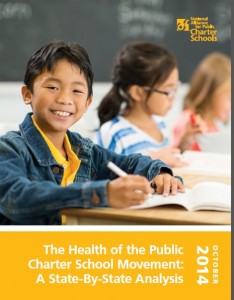 While the growth of Florida charter schools has made the state a national leader in the sector, a new report by the National Alliance for Public Charter Schools ranks Florida toward the middle of 26 states with a significant charter school presence.
While the growth of Florida charter schools has made the state a national leader in the sector, a new report by the National Alliance for Public Charter Schools ranks Florida toward the middle of 26 states with a significant charter school presence.
This year’s report on the health of the charter school movement looks at a combination of measures of growth, innovation, and quality. To earn top marks, a state’s charter schools need to serve a substantial share of a state’s public-school students, enroll greater proportions of low-income and minority students, and show stronger academic growth.
By the measures used in the report, Michigan and Louisiana rank near the top. Florida ranks 11.
The report credits Florida’s charter schools for serving significant portions of the state’s students and for serving high proportions of minority students. But the state’s charters don’t score as well in academic comparisons with traditional public schools and serve relatively lower proportions of students who qualify for free and reduced-price lunches.
The charter alliance gives Florida stronger marks for its charter laws, ranking the state eighth out of of 43 states. And a separate report released Wednesday by the Center for Education Reform ranks Florida second in “parent power.” In other word, the state has laws on the books that help parents find quality education options. The charter school report notes that “supportive laws are necessary but not sufficient.”
The report has some advice on how Florida’s ranking might improve.
To better support the growth of high-quality public charter schools, we recommend that the state continue to strengthen charter school and authorizer accountability, enhance its funding and facilities support to charters, and explore why public charter schools are serving a lower percentage of free and reduced-price lunch students.
There’s already a drumbeat building around some of those issues going into next year’s legislative session – especially facilities funding and high-needs areas.
Closing the funding gap with traditional public schools could help Florida charter schools cover the cost of the buildings without having to dip into funds that would otherwise got to classrooms. Opening more schools in high-needs urban areas would likely drive up the proportion of students who qualify for federally subsidized lunches.
Improving authorizing, meanwhile, has been on the radar of charter school advocates for years. But it’s trickier in Florida than in some other places. The report praises top-scoring states like Michigan and Louisiana for allowing organizations other than traditional school districts to authorize charter schools, and many charter advocates have suggested creating statewide charter school authorizers.
But courts have blocked attempts to create authorizers in Florida other than district school boards. The state constitution stipulates that “The school board shall operate, control and supervise all free public schools within the school district.” Universities have some authority to authorize charters, too, but that’s been limited to their lab schools. As a result, the authorizers of 99 percent of Florida’s charter schools are also, in a sense, their main competitors.
With that limitation, attempts to improve authorizing in Florida have focused on issues like preventing school districts from blocking charter schools trying to open. At the same time, efforts to help districts screen out bad operators – without unnecessarily restricting good ones – are starting to get more attention.



[…] REPORT RANKS FLORIDA CHARTER SCHOOL MOVEMENT IN MIDDLE OF THE PACK via Traivs Pillow of redefinED […]